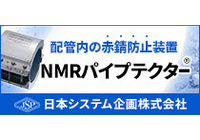Case Study on the Introduction of "NMR Pipe Protector" - NMRPT - to the Royal Bank of Scotland (RBS) Final Episode
日本システム企画 東京本社
The effects of the introduction of the NMR Pipe Protector at the Royal Bank of Scotland became apparent immediately. A re-examination of the iron content in the hot water, which was 1.10 mg/l before installation, showed that after nine weeks, the hot water was clear, and the amount of dissolved iron had decreased to about one-third, at 0.41 mg/l. The investigation continued for a year, and the iron content in the same hot water ultimately decreased to about one-thirtieth of the pre-installation level, at 0.03 mg/l. The progression of red rust within the pipes also stopped, and the red rust transformed from the surface to black rust. It can be said that the NMR Pipe Protector fundamentally solved the red rust problem without the need to replace the piping. The fact that an innovative and influential company like the Royal Bank of Scotland adopted the NMR Pipe Protector is very significant. The environmentally conscious management policy has shown even greater movement as of April 2020 and is being applied to investment targets as well. The benefits of cost reduction, along with proactive efforts to address global environmental destruction issues without updating energy-consuming piping, will serve as a good stimulus for other companies. Not only in the UK but also in Japan, the number of buildings, such as apartments and hospitals, that are introducing the NMR Pipe Protector is increasing year by year.

